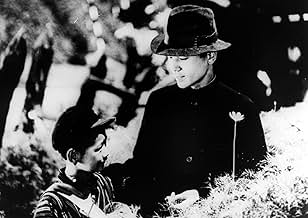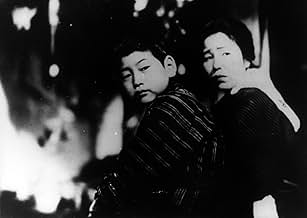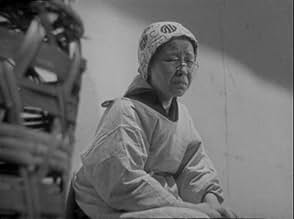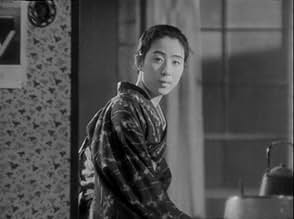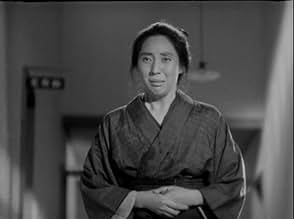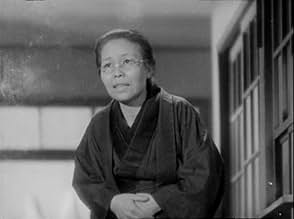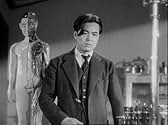CALIFICACIÓN DE IMDb
7.7/10
4.3 k
TU CALIFICACIÓN
Una viuda descubre que su único hijo se ha convertido en un humilde profesor.Una viuda descubre que su único hijo se ha convertido en un humilde profesor.Una viuda descubre que su único hijo se ha convertido en un humilde profesor.
- Dirección
- Guionistas
- Elenco
Jun Yokoyama
- Okubo's son
- (as Bakudan Kozô)
Tomio Aoki
- Tomibo
- (as Tokkan Kozô)
Seiichi Katô
- Kinjo no ko
- (as Seiichi Kato)
- Dirección
- Guionistas
- Todo el elenco y el equipo
- Producción, taquilla y más en IMDbPro
Opiniones destacadas
"The Only Son" is Ozu's first "talkie" - and utilizes sounds in an efficient, restrained manner to help tell the story with calm grace. The beautiful simplicity that pervades the piece is classical Ozu, and amplifies the poignant tale of a mother coming back to visit her son, after sacrificing her livelihood to ensure he achieves higher education. When she realizes that he is unsatisfied with his life as a night-school teacher, a general melancholic tone begins to unfold through the progression of the narrative. The ending is nicely done, and overall, the film is crafted in that spare, simple perfection that is the stylistic hallmark of Ozu's cinema.
This is a nice piece of work from early Japanese cinema that's worth checking out for all fans of this period's films.
The plot is simple, nothing really special if you ask me, but Ozu sure knew how to handle this kind of simple stories he portrayed in all his films. It's a slow-paced film, which adds a more natural feeling to it in my opinion, full of powerful and emotional images supported by a really splendid and natural acting (as usual in Ozu's films).
Ozu really stands out from many other directors, he had the ability to portray life on screen and here you can definitely see it.
At first this kind of filmmaking didn't do much for me, but it has really grown on me with time. It surely is not for everyone; Ozu is just different cinema.
My score: 8.5/10
The plot is simple, nothing really special if you ask me, but Ozu sure knew how to handle this kind of simple stories he portrayed in all his films. It's a slow-paced film, which adds a more natural feeling to it in my opinion, full of powerful and emotional images supported by a really splendid and natural acting (as usual in Ozu's films).
Ozu really stands out from many other directors, he had the ability to portray life on screen and here you can definitely see it.
At first this kind of filmmaking didn't do much for me, but it has really grown on me with time. It surely is not for everyone; Ozu is just different cinema.
My score: 8.5/10
The simple story follows Tsune (Choko Iida), a widow and single mother who struggles in a factory job to provide for her son Ryosuke. She sacrifices everything in her own life to pay to send Ryosuke off to the best middle and high schools, toiling away at her thankless job while never getting to see her son. It's not until many years later, when the now-grown Ryosuke (Shin'ichi Himori) gets a surprise visit from his mother at his Tokyo home, that the two assess their lives.
This was Ozu's first sound film, and he can't help but poke fun at the format, with one scene seeing Ryosuke and Tsune attending a "talkie" movie, the old woman's first, only for her to fall asleep during it. But while there are many moments of gentle humor, this is largely a serious affair, taking an unflinching look at familial obligation and expectation. The film asks what the true measure of a man is. Is it financial success, material wealth, a nice home and fat bank account? Or can it be strength of character and generosity of spirit? Ozu doesn't give any definitive answer, and the final sequence of the film leaves the true feelings of Tsune toward her son rather ambiguous.
This was Ozu's first sound film, and he can't help but poke fun at the format, with one scene seeing Ryosuke and Tsune attending a "talkie" movie, the old woman's first, only for her to fall asleep during it. But while there are many moments of gentle humor, this is largely a serious affair, taking an unflinching look at familial obligation and expectation. The film asks what the true measure of a man is. Is it financial success, material wealth, a nice home and fat bank account? Or can it be strength of character and generosity of spirit? Ozu doesn't give any definitive answer, and the final sequence of the film leaves the true feelings of Tsune toward her son rather ambiguous.
"The Only Son" is Ozu's first "talkie" - and utilizes sounds/dialogue in a stylistic manner to tell a simple story. The beautiful simplicity that pervades the piece is classical Ozu, and amplifies the poignant tale of a mother coming back to visit her son, after sacrificing her livelihood to ensure he achieves higher education. When she realizes that he is unsatisfied with his life as a night-school teacher, a general melancholic tone begins to unfold through the progression of the narrative.
There are some fine indoor shots of the house where the son lives, and also, some greatly composed scenes of the run-down industrial neighborhood where the son goes out to buy "noodles" from a nearby stand. What's also memorable about the film is its excellent rendition of outdoor nature shots, one scene stands out in my mind where the son is having a discussion with his mother. There is also a great shot of the night-school teacher looking out dismal and lonely from the school-building to a city sign, which is juxtaposed against a dark, night sky.
The ending is nicely done, and overall, the film is crafted in that spare, simple perfection that is the stylistic hallmark of Ozu's cinema.
There are some fine indoor shots of the house where the son lives, and also, some greatly composed scenes of the run-down industrial neighborhood where the son goes out to buy "noodles" from a nearby stand. What's also memorable about the film is its excellent rendition of outdoor nature shots, one scene stands out in my mind where the son is having a discussion with his mother. There is also a great shot of the night-school teacher looking out dismal and lonely from the school-building to a city sign, which is juxtaposed against a dark, night sky.
The ending is nicely done, and overall, the film is crafted in that spare, simple perfection that is the stylistic hallmark of Ozu's cinema.
10soren19b
It is a shame that this film is not available for wider viewing. I had the opportunity of seeing it at an Ozu retrospective in Cleveland. This film measures up to the other great classic Ozu films. The impact of Ozu's films works in much the same way as Japanese painting. There is great power in its open spaces and silences. They lend greater power to the words and emotions that are expressed. The dignity of the characters as they struggle with life is moving. Ozu is a master
of world cinema because he deals with themes of universal import and he does so with impeccable style. Especially noteworthy in this film is his effective use of music and sound. All in all, a very worthwhile experience
of world cinema because he deals with themes of universal import and he does so with impeccable style. Especially noteworthy in this film is his effective use of music and sound. All in all, a very worthwhile experience
¿Sabías que…?
- TriviaThis was Yasujirô Ozu's first feature film with all-synchronous dialogue.
- ConexionesFeatured in A Train Arrives at the Station (2016)
- Bandas sonorasOld Black Joe
Written by Stephen Foster
Selecciones populares
Inicia sesión para calificar y agrega a la lista de videos para obtener recomendaciones personalizadas
- How long is The Only Son?Con tecnología de Alexa
Detalles
- Tiempo de ejecución
- 1h 22min(82 min)
- Color
- Mezcla de sonido
- Relación de aspecto
- 1.37 : 1
Contribuir a esta página
Sugiere una edición o agrega el contenido que falta

